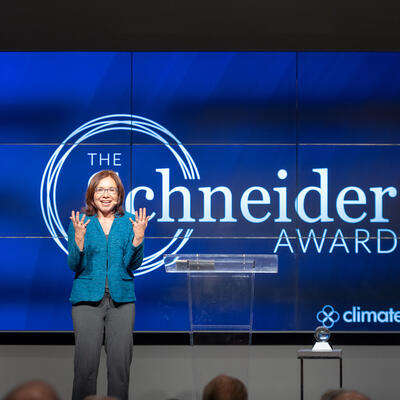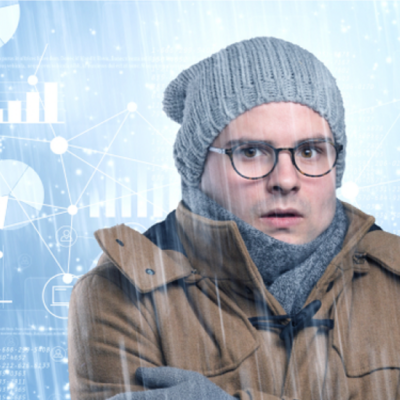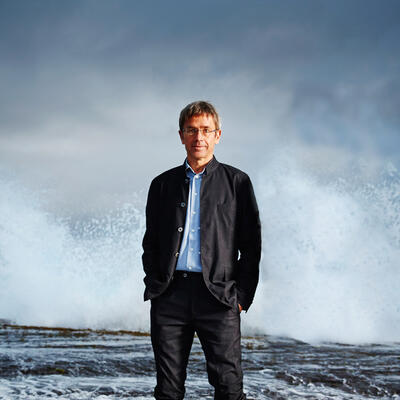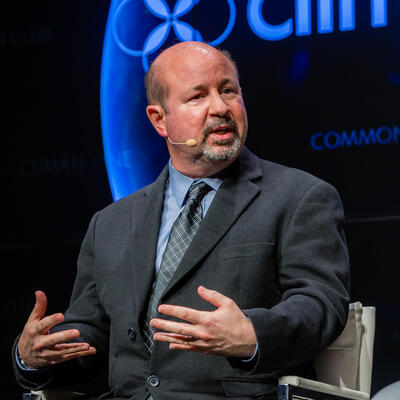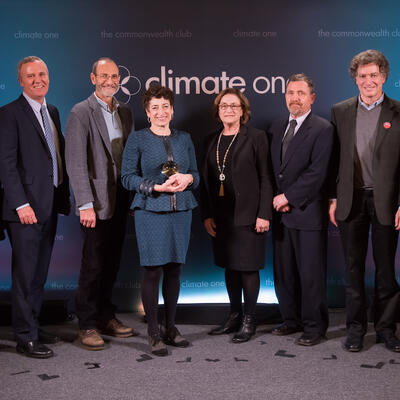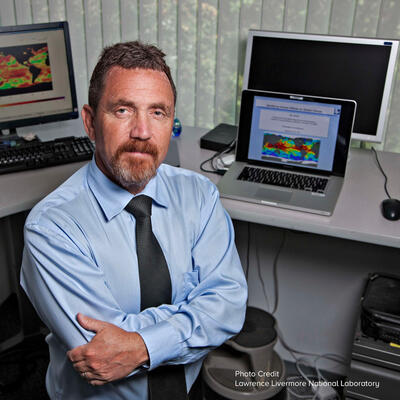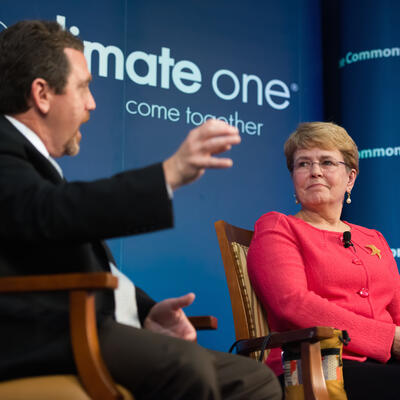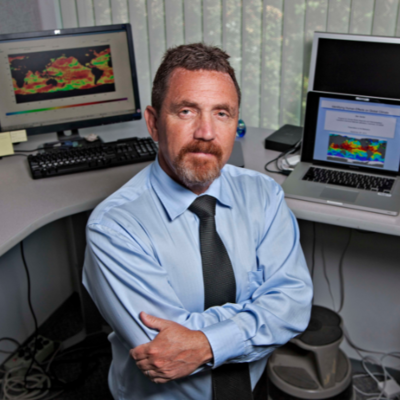
Ben Santer: 2023 Schneider Award Winner
Guests

Ben Santer
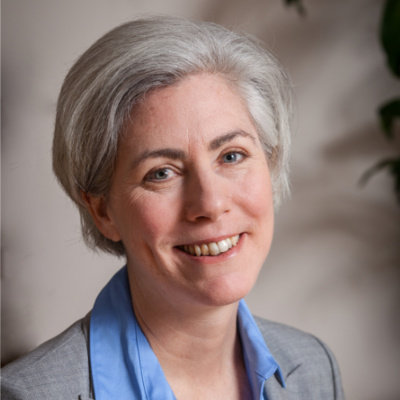
Kassie Siegel
Summary
Every year Climate One honors a scientist who makes breakthroughs and delivers them to a broad public with the Stephen H. Schneider Award for Outstanding Climate Science Communication. This year’s winner is atmospheric scientist Ben Santer, who has spent his career helping prove that humans are driving climate disruption. His work burst onto the world stage at an IPCC meeting in 1995.
“It was the first time that the international scientific community spoke with one voice and said, we see it. We can formally identify a human caused global warming signal,” Santer says.
Santer’s work literally changed what we know and understand about climate. His research identified “human fingerprints” in atmospheric temperature and water vapor and ocean heat content. That led to the conclusion that humans are responsible for changing the global climate – a hugely significant finding that flew in the face of people claiming changes in climate were due to naturally occurring cycles.
Just 12 words that Santer wrote in that 1995 IPCC report – “the balance of evidence suggests a discernible human influence on global climate” – threatened automakers and fossil fuel companies, who then tried to scare and silence him.
“I think it's fair to say that those 12 words upset a lot of people. Powerful companies, organizations like the Global Climate Coalition, a consortium of energy interests, powerful congressmen like Dana Rohrabacher,” Santer says. “This was threatening to corporate interests. So how do you attack the science? You take down the scientists.”
Santer says in 1996 he actually considered leaving the field, because he received so many threats and forms of pressure.
“Steve [Schneider], at that vulnerable moment in my personal and professional history, encouraged me to stick with it. I remember vividly what he told me, that the attacks that I was experiencing meant that the work my colleagues and I were doing really mattered to others. And that in science, you often measure yourself not by the number and quality of papers you accumulate over time that you publish, but by the number and the power of the enemies you accumulate.”
In the subsequent years, he hasn’t backed down. Ben Santer recently left Lawrence Livermore National Laboratory and is now a scholar in residence at Woods Hole Oceanographic Institution and a visiting researcher at UCLA. And his work is now being cited in the courts.
California filed a case against five of the world's largest oil companies and the American Petroleum Institute, the latest in what's referred to as climate accountability litigation.
“These cases are very powerful tools for holding fossil fuel companies accountable for the damage that they've caused and the lies that they've told,” says Kassie Siegel, director of the Climate Law Institute at the Center for Biological Diversity. “And in California's case, like the other climate damages cases, the plaintiffs are arguing that the oil companies knew about the climate science, they lied about the climate science, and therefore they should be held accountable.”
“There would be no climate law without climate science. And Dr. Santer's work is particularly pivotal in this case,” she says.
Santer says climate scientists should engage with the debate about their work, even if it feels uncomfortable.
“It's intensely frustrating to me to see this disconnect between our mature scientific understanding of the reality and seriousness of climate change and political inaction which we're witnessing on a daily basis. So I do think it's important for scientists to get out of their comfort zone sometimes and, and speak not only as experts, but say, I'm speaking as a human being… and the imperative of trying to fix things before it's too late.”
Episode Highlights
05:30 – “The balance of evidence suggests a discernible human influence on global climate”
09:00 – “So how do you attack the science? You take down the scientists.”
10:20 – Threats against him
14:45 – Specious Freedom of Information Act requests
19:15 – Event attribution data
22:40 – Working at a National Lab during the Trump administration
28:00 – How scientists can respond to pressure and threats to their work
36:30 – Teaching judges how to interpret climate science data in cases
39:10 – “There would be no climate law without climate science.”
42:00 – Exxon knew all of this decades ago
45:00 – Role of source attribution in court cases
Resources From This Episode (4)
Full Transcript
Note: Transcripts are generated using a combination of automated software and human transcribers and may contain errors. Please check the actual audio before quoting it.
Greg Dalton: This is Climate One, I’m Greg Dalton.
Ariana Brocious: And I’m Ariana Brocious.
Greg Dalton: This is one of my favorite times of the year because it’s when we here at Climate One recognize a scientist making a valuable contribution to public understanding of how burning fossil fuels is disrupting everything around us. That’s leading to more severe fires, floods, extreme storms, droughts. Rocks our world.
Ariana Brocious: Many people see and experience those things. They know they are happening. But explaining the underlying science is really complicated, and technical. Especially when it comes to understanding how humans are causing climate disruption.
Greg Dalton: Right, so we rely on communicators – such as authors and journalists – to help decode the wonk and explain the science to a general audience. The goal being to engage people across the spectrum of experience and inspire them to action.
Ariana Brocious: Yeah, and that’s so critically important because the discussion of science and human behavior has only become more polarized – so it’s going to take the work of all of us, not just experts, to make durable change.
Ariana Brocious: It’s the 13th year we’ve given out the Stephen Schneider Award for Outstanding Climate Communication, named in honor of a prominent climate scientist and one of your mentors, Stephen Schneider.
Greg Dalton: That’s right. Steve was hugely influential in my climate journey…
Ariana Brocious: So why did you create this award named after him?
Greg Dalton: Because in 2010, he wrote to me. He was not in good health. He wrote to me and said he needed to stop burning the candle on both ends and in the middle. He planned to fly back from a scientific meeting in Europe and come to a Climate One dinner. And he died on the airplane. And that hit me really hard and I decided to create this award in his honor because he was such a compelling, fierce communicator. He could really distill science and make it relatable. For example, he talked about the false equivalence that mainstream media outlets employed when reporting on climate science. Here he is in 2009 on the Climate One stage.
Steve Schneider: When you're covering a complex topic like climate change or health or education or security, and there's no such thing as yes or no, There's all these gradations of possibilities with different probabilities attached. and you go out there and you take a 200 scientist report, like the Intergovernmental Panel on Climate Change, it goes through three years of writing, two rounds of reviews, a thousand review comments on every chapter. And then two petroleum geologists, paid by, you know, which oil company, because they have PhDs that give an equal, status in a story or on television. You see, we get a little mad about that, and we call that utter distortion. And they say, Oh no, that's balance. It is not balance, it is utter distortion because they are not reporting the relative credibility of the multiple positions. And it means that you're leaving it up to the public and the political world to figure that out for themselves.
Greg Dalton: And I’m delighted that this year our jury of experts chose atmospheric scientist Ben Santer to receive this award.
Ariana Brocious: Ben Santer recently retired from Lawrence Livermore National Laboratory and is now a scholar in residence at Woods Hole Oceanographic Institution and a visiting researcher at UCLA.
Greg Dalton: He’s won many other prestigious awards, including the famous MacArthur fellowship, but told me that this award is especially meaningful to him because he knew and admired Steve.
Ariana Brocious: Ben’s work has literally changed what we know and understand about climate. His research identified “human fingerprints” in atmospheric temperature and water vapor, and ocean heat content. That led to the conclusion that humans are responsible for changing the global climate – a hugely significant finding. But that was hard for some institutions and people to hear. Even now, many powerful people and corporations do not want to own up to this fact.
Greg Dalton: That's right, because it flies in the face of people claiming changes in climate were due to naturally occurring cycles. Many times, I’ve heard people say the climate is always changing and it always will. Ben’s work debunked all that and moved the denial machine on to other arguments.
I talked with Ben Santer in front of a live audience at the Commonwealth Club in San Francisco. And we started by looking back at a moment early in his career – an encounter that defined his life’s work and had a huge impact on how climate is discussed around the world.
Greg Dalton: In 1995, you're in Madrid at a meeting of the IPCC. This is just a couple of years after their first Rio summit, and set the scene. Who's there? What's at stake? What's going on in Madrid in 95?
Ben Santer: IPCC plenary meeting. The goal of the meeting is for the governments of the world to approve the summary for policymakers that scientists have been working on for one and a half years and to accept the underlying report on which that summary is based. The first IPCC assessment in 1990 had essentially said the jury's out. We can't tell whether humans are affecting the global climate. But in Madrid, the story was different. Fundamentally different. And the bottom line finding was these infamous 12 words, “the balance of evidence suggests a discernible human influence on global climate.” It was the first time that the international scientific community spoke with one voice and said, we see it. We can formally identify a human caused global warming signal.
Greg Dalton: It's us. It's us. Humans.
Ben Santer: It's us. And that was a big deal. There were countries present in Madrid, like the Saudis and Kuwaitis, who did not like that finding. They recognized at a time, really, when scientists did not, that this was some sea change. It meant that at least there was the possibility that they would have to change the way they do business. And one of the people in the room, in Madrid, was your friend, and my friend, Steve Schneider. Steve was the convening lead author, one of the lead authors, for the final chapter of that IPCC report called Advancing Our Understanding. That was the chapter that tried to chart the way forward. What are the important things to focus on scientifically? And Steve understood better than anyone else in the room, the importance of those 12 words.
Greg Dalton: And just to jump in, so people haven't been there, these are literally screens with text on the, you know, big rooms with people literally haggling over commas and, and, and words. Right. Hundreds of people are arguing over one word –
Ben Santer: That's exactly right. There was simultaneous translation, so the discussions on stage were being translated into Chinese, Russian, Japanese, and much of the final discussion in Madrid was about the nuances of language. How does a word like discernible translate into Japanese or Chinese? Does it have the same meaning? Who knew as a scientist? Nothing in your career prepares you for having these kind of? discussions about the nuance and power of language But we did. We arrive at these 12 words. We go out to dinner. I just want a beer. I'm hungry. And Steve Schneider was sitting next to me at the restaurant. This is about 2 a. m. on the morning of the 30th of November. And he turns to me in the way that he often did in conferences and said, This will change the world, this sentence. I had no idea what he meant.
Greg Dalton: And it changed your life. How did it change your life?
Ben Santer: I think it's fair to say that those 12 words upset a lot of people. Powerful companies, organizations like the Global Climate Coalition, a consortium of energy interests, powerful congressmen like Dana Rohrabacher. They understood that this was fundamentally different in 1995 from 1990 and the jury is out. That wasn't threatening. This was threatening to corporate interests. So how do you attack the science? You take down the scientists. You go after the process. You argue that the process was political, not scientific. You argue, as the Global Climate Coalition did, that there was scientific cleansing, as they called it. This, 1995 at the time that ethnic cleansing is going on in Bosnia so that all uncertainties had been purged from the report. It was a nasty game.
Greg Dalton: And then, they actually came at you. It’s one thing to write an article in the Wall Street Journal, it's another thing to come to your house. How did this opposition come to your doorstep?
Ben Santer: It's fair to say, as you did, that my life changed with those 12 words. I would be inextricably linked to them for the rest of my life. Nothing I could do or say would separate me from those 12 words. And a lot of people didn't like them. And some people didn't like them sufficiently to actually come to my doorstep. This happened when my son Nick and I were in our house in San Ramon, knock on the door about 10 o'clock at night, I go downstairs to answer the door. There's a dead rat on the doorstep and a guy driving away at high speed in a yellow Hummer shouting curses at me. The police told me to be on the lookout for yellow Hummers, which I have done diligently ever since then.
Greg Dalton: And you also, when you went, approached your car, you had some thoughts about…
Ben Santer: Yeah, I was afraid. There were people writing threatening letters, sending threatening emails. I had no idea what they were capable of doing. In my opinion, that was the beginning of organized climate denial, and organized harassment of climate scientists. If you come up with findings we don't like, and have the temerity to publish them and speak publicly about them, we will come down on you like a ton of bricks.
Greg Dalton: And it scared your son, too.
Ben Santer: It did. It was terrible. As a parent, you want to protect your kids. That's your prime directive, right? To keep them from harm. And the sense that my son Nick did not feel safe in our house after this dead rat on the doorstep. Incident made me so angry and anger is toxic. You've got to figure out some way of dissipating that. And I think I did in the end. But the bottom line is this isn't a game. When you send someone threatening emails or letters or write op eds in papers like the Wall Street Journal attacking them, there are consequences. And we see those consequences still today, unfortunately.
Greg Dalton: And Nick, your son at that point was, I think, quite young and he slept with a wooden sword, right?
Ben Santer: Yeah, he had a little wooden sword. I still have it at home, that he put next to the side of the bed. Again, because he didn't feel safe in our house. And no one can take that away. No one can remove that sense of not feeling safe in your own house.
Greg Dalton: Did you consider quitting science?
Ben Santer: In 1996 I did, for a variety of reasons. My life was falling apart. My marriage had fallen apart, and I wondered whether it was worth it continuing with science. Steve [Schneider], at that vulnerable moment in my personal and professional history, encouraged me to stick with it. I remember vividly what he told me, that the attacks that I was experiencing meant that the work my colleagues and I were doing really mattered to others. And that in science, you often measure yourself not by the number and quality of papers you accumulate over time that you publish, but by the number and the power of the enemies you accumulate over time. It was sort of, welcome to the club, Ben. Because at that time in 1996, Steve, who had spoken so powerfully and clearly about the reality and seriousness of climate change. One of the first bellwether voices had experienced his fair share of public attacks.
Greg Dalton: Fearless, yeah. Unfortunately, many climate scientists have experienced that. I think you perhaps more than, than most. You also got harassed with freedom of information requests. Tell us about that.
Ben Santer: Well, Freedom of Information Act requests, open record requests are a legitimate tool for shedding light on complex issues, enhancing transparency in government, but they can also be abused for illegitimate purposes. And in the early 2000s, that's exactly what happened to many climate scientists, not only here in the United States, but also in the UK, where, bad actors, folks who were not interested in improving understanding of the science overwhelmed universities and individual researchers and research institutes with specious open records requests to eat up their time, to throw a spanner in the works, to prevent them from doing their jobs. That still continues to this day, unfortunately, which is one of the reasons I do not wish to have any federal funding. Because if I receive federal funding, then I am subject to those requests.
Greg Dalton: You have to lawyer up, right, and if you work for a national lab, like, you know, who represents you? Is that the lab's job or do you have to hire your own lawyer and there's actually a non profit out there that raises money to, to legally defend scientists, right?
Ben Santer: I think the challenge is, Greg, how do you want to spend your time? Do you want to spend your time doing science? That's what I signed up for. I didn't sign up for spending days, weeks, months, dealing with a succession of specious Freedom of Information Act requests. That's not how I want to spend my time.
Greg Dalton: And you spent decades at a national lab. And you are, you know, kind of Mr. Fingerprint. You've kind of pioneered this area of attribution science. Why don't you tell us what is a human fingerprint and how do we know? Because that science has evolved quite a bit.
Ben Santer: I stood on the shoulders of giants. So one of those giants was Klaus Haselmann, who back in 1979 wrote the first paper outlining an elegant mathematical approach for doing fingerprinting, for separating, if you will, a human caused global warming signal from the background noise of natural climate variability. Think things like El Niños, La Niñas, the rich natural fluctuations in climate on monthly, inter annual, decadal, and longer timescales.
Greg Dalton: You hear that all the time, you know, Oh, climate's always changing. It always has, always will.
Ben Santer: Right. And it does, and will in the future and has in the past. But what we're doing by burning fossil fuels and increasing levels of carbon dioxide in the atmosphere and other potent greenhouse gases is we're increasing the ability of the atmosphere to trap heat and thereby warming the surface of the planet and the oceans. We're changing everything. We fingerprinted pretty much every aspect of the climate system and human fingerprints are everywhere. Hasselmann's key insight back in 79 was: Look at patterns. If you move beyond one number, the average temperature of the planet, global mean temperature, and look at the complexity of geographical patterns of climate change, or slices through the atmosphere, right from the stratosphere, over 20 kilometers above the surface, down to the depths of the ocean, then you have a better chance, in that pattern analysis, of separating human fingerprints from natural climate variability, and that's what I've done together with brilliant women and men all around the world, many of them here in this audience tonight, is we've tried to fingerprint the climate system.
Greg Dalton: And it used to be, you would hear on the news all the time, “well, no single event can be linked to climate change. You have to look at patterns over time.” I remember when Hurricane Sandy hit New York, Bloomberg Businessweek, this, “it's climate change, stupid.” You know, where are we now? Can you, can we today say, this storm, this drought, this flood is climate change?
Ben Santer: So in some cases we can say that this particular event like the off the charts warming in the Pacific Northwest a few years ago would have been impossible without climate change.
Greg Dalton: 106 degrees in Portland.
Ben Santer: It was so far off the charts, so far outside of any instrumental records, it couldn't have happened without human caused warming of the surface of the earth and the atmosphere and the oceans. So what you speak to is this area of research called event attribution, where after the 2003 European summer heat wave, catastrophic event, excess mortality of roughly 70,000 people, warming of nearly two degrees Celsius relative to normal temperatures, catastrophic event. And scientists in the UK ran a climate model with human effects on climate and without human effects on climate in order to assess how human caused warming had changed the likelihood of something like the European summer heat wave. And that is now being done routinely. It's being done by one of my colleagues here in the audience, Michael Wehner, in very innovative and sophisticated ways. The bottom line from pretty much all of this research is we're changing the odds. So Steve Schneider's analogy was loading the die. We're changing the dice so that it's more likely to get longer lasting, more extreme extreme events. Think droughts, floods, heat waves, and that's bad. We're playing a game that's not a game, and we're loading the die in favor of bad outcomes.
Greg Dalton: Today on Climate One, a conversation with Ben Santer, this year’s winner of the Stephen Schneider Award for Outstanding Climate Communication. If you missed a previous episode, or want to hear more of Climate One’s empowering conversations, subscribe to our podcast wherever you get your pods.
Ariana: Please help us get people talking more about climate by giving us a rating or review. You can do it right now on your device. You can also help by sending a link to this episode to a friend.
Coming up, why Ben feels so strongly that scientists can’t back down, even when they’re under attack:
Ben Santer: There are times when you have to choose, when there's a fork in the road. And those choices may be tremendously difficult. Be brave.
Greg Dalton: That’s up next, when Climate One continues.
Ariana Brocious: This is Climate One. Let’s get back to Greg’s conversation with atmospheric scientist Ben Santer, in front of a live audience at the Commonwealth Club in San Francisco.
Greg Dalton: From 2016 to 2020, a lot of things happened. Wildfires really took off in the American West. Storms that I can't even remember happened. They kind of blur and roll into another. That was a tough time for you, working at a national lab, in a political climate hostile to your work. Tell us about that period.
Ben Santer: It was a difficult four year period. I love my job. I was working together with some of the best and the brightest, such a joy to spend decades of my life together with them trying to evaluate climate models, trying to fingerprint the climate system, trying to understand how this beautiful and complex world in which we live is changing and why it's changing. But the Trump administration was no big fan of this kind of work. And they did not want us to do this kind of work, or to speak about it, or to speak about it in terms of fingerprinting. Folks wanted these euphemisms. And to me, there's no point being a scientist, if you're unwilling to speak publicly about the technical work that you do, if you're unwilling to defend it when it comes under unjustified political attack. And I'm proud of the fact that we did. We didn't just roll over and say this powerful individual, the President of the United States, is incorrectly dismissing everything we're doing as a hoax and a conspiracy. It's not. And we all lose if we let that narrative of hoax and conspiracy prevail. We can't allow that to happen. So we continued doing this critically important work, and I'm proud to say that it continues at Livermore today. We need evidence, which I think we'll be talking about in a few minutes. The courts need evidence, and scientists need to provide the best scientific information on the nature and causes of climate change.
Greg Dalton: So you left and the work goes on, you're now working at the Woods Hole Oceanographic Institution, you're an atmospheric scientist, not an oceans person, what are you doing there? How did they let you in? And what are you learning?
Ben Santer: Well, Woods Hole has kindly given me a two months per year gig. And it turns out that you can teach an old dog new tricks. So, I have spent most of my professional life in the atmosphere, doing fingerprinting with temperature in the atmosphere, with moisture, with many different things. But, I'm pretty ignorant when it comes to the ocean. This was an opportunity to do fingerprinting in the ocean. To learn from some of the best and the brightest, the folks at Woods Hole make a ton of interesting and innovative measurements of ocean temperature and salinity and what's happening under Antarctic ice shelves and they build robotic systems that go to the depths of the ocean that now look at not only temperature and salinity but ocean chemistry as well. My job is to try and interact with those folks who make the measurements, to use them for fingerprinting, for understanding how and why the oceans are changing, it's wonderful.
Greg Dalton: And the oceans have really saved us. They're mind boggling, I mean, the oceans are absorbing a huge amount of carbon and if they weren't doing that, it would be insanely more hot, right?
Ben Santer: Yeah, the oceans have been absorbing much of the heat, over 90 percent of the heat that we have generated by burning fossil fuels and increasing levels of heat trapping greenhouse gases in the atmosphere. So it seems critically important to understand how the oceans are changing, particularly at depth, where we have so few measurements, much of the ocean is tabula rasa and the folks at Woods Hole and many other oceanographic institutions around the world are trying to fill in the gaps and help us understand how the oceans are changing. So it's wonderful at this late stage in my life To be mentoring young students to be thinking about the oceans and to recognize that my expertise still has value to others.
Greg Dalton: Do you feel more free not working for a national lab? Can you like, be more edgy with your words, with your, can you, I mean, because working for a national lab, there's certain constraints. Do you feel liberated?
Ben Santer: I was always pretty edgy, I would say, but I was very mindful of my colleagues. You know, I was for some period of time until my colleague, Celine Bonfie, who's here in the audience tonight took over. I was the leader of the Climate Change Detection and Attribution Group at Lawrence Livermore. And these were my colleagues in that group and my friends, and I didn't want to do anything that might negatively impact them, their funding, their families. So it was very difficult being in that position, where you're charged with trying to secure funding for a group. But at the same time as you're charged with doing that, the very work you're doing is coming under unjustified political attack. What do you do? Do you just zip it and say nothing? Or do you continue to try and do the best research you possibly can, while also speaking publicly about the importance of doing that work? That's what I chose to do.
Greg Dalton: And there's quite a debate now about scientists, whether they ought to stick, stay in their lane, or, you know, some scientists get political and start making policy prescriptions. Rose Abramoff was fired from a national lab for protesting. What do you think is the, you know, we are in this urgent crisis, what is the appropriate role of a scientist, and where are, where are the lines?
Ben Santer: Well, that's a great question, and I think that it is critically important to delimit the boundaries of your expertise, which I always try to do. I'm a physical climate scientist. I spent my entire career trying to understand the climate system, how we're changing it by increasing greenhouse gases, but also how it changes naturally through volcanoes and intrinsic variability and all that nice stuff. But at the same time, like Steve Schneider, I'm a citizen of this planet and I care a lot, as you do, about the kind of world we are bequeathing to our kids and our grandkids and many, many future generations. It's intensely frustrating to me to see this disconnect between our mature scientific understanding of the reality and seriousness of climate change and political inaction which we're witnessing on a daily basis. So I do think it's important for scientists to get out of their comfort zone sometimes and, and speak not only as experts, but say, I'm speaking as a human being, as, as a father, as a wife, as someone who cares about this. These are my values. And I want you to understand that when I'm speaking about my values, I'm speaking from the heart. as a human being. So I try and do that in all of my public lectures now. I talk about fingerprinting. I talk about evidence. I talk about the importance of evidence. But I also talk about being a human being and human values and the imperative of trying to fix things before it's too late. And there, I am now increasingly willing to get into policy issues and willing to say what I feel as a non expert on these issues. But from my interaction with real experts, I think carbon pricing, some form of carbon pricing is the way to go in addressing this problem.
Greg Dalton: And another area like that, Lawrence Livermore National Lab been in the news recently for nuclear fusion. Some people think that that's the holy grail. That's not your area of expertise, but you were inside that institution. Are you excited about the prospect of fusion? That experiment was, they created net positive energy for a fraction of a second.
Ben Santer: Many institutions, not just Livermore, are pursuing fusion research in a variety of different forms. Livermore's with lasers, others with very powerful magnets. Let's hope that some of these things pan out. But betting on that, betting that one of them will go from essentially a demonstration to sustained practical fusion energy in a time frame where it can really make a difference to us, I'm skeptical about that personally. I think we need to do the things we can do already as powerfully and at scale, without waiting for some magic bullet that may or may not be on the horizon. Let's do what we can now and get our act together.
Greg Dalton: Rather than some techno fix down the horizon, right, means we don't have to change our ways. So much of what you and other climate scientists have been predicting for decades have come true faster than predicted and expected with devastating impacts around the world, devastating human impacts. What's it like? Do you ever feel like, I told you so?
Ben Santer: No, I feel sadness. There's great intellectual satisfaction in doing this kind of work. It's a detective story, a whodunit. And–
Greg Dalton: But don’t you ever think, “if you had just listened to us, argh!?”
Ben Santer: I've really loved improving in a small way our understanding of the nature and causes of climate change. But as some of these predictions have come to pass, there's sadness. There's no joy in seeing something that someone predicted 55 years ago. The warming of the troposphere and the cooling of the upper atmosphere as we ramp up levels of greenhouse gases. We've shown that. Others have shown that now, as clearly as you possibly can.
Greg Dalton: 1950, Edward Teller, your former colleague at Livermore, told the American Petroleum Institute at Columbia University, you've got a problem.
Ben Santer: Yeah, we've known about the problem of human intervention in the climate system for a long time, and the evidence has gotten stronger and clearer every year, almost. Which brings us to 2021 and the sixth assessment report of the IPCC and this famous word unequivocal. It is unequivocal that human fingerprints are everywhere in the climate system, in the oceans, in the land, in the atmosphere. We can't deny that reality anymore. It's all around us and yet political action and ambition is out of sync with that mature scientific understanding. That's the frustration. Yeah, it's nice to do this work, but there's no joy in seeing predictions come true. There's no, I told you so.
Greg Dalton: Coming up, how Ben’s climate detective work is showing up in court.
Kassie Siegel: There would be no climate law without climate science. And Dr. Santer's work is particularly pivotal in this case.
Greg Dalton: That’s up next, when Climate One continues.
This is Climate One. I’m Greg Dalton.
Ariana Brocious: I’m Ariana Brocious. It’s inspiring to hear how Ben Santer has dealt with the direct and indirect threats to his work. It’s scary to think about someone coming to threaten you at your home. And it’s fitting for him to win our annual award named after Steve Schneider. Steve Schneider wrote a book called “Science As a Contact Sport.”
Greg Dalton: He did.
Ariana Brocious: And speaking of fights, Ben's work has also entered another arena: the courts. His science lays the foundation to connect specific polluters to specific climate impacts. This is something called attribution science - analysis has been a key part of emerging climate change litigation.
Greg Dalton: In fact Ben has been spending time teaching judges about climate science, so that they know how to weigh this new kind of evidence, like “fingerprinting” or satellite data in cases involving oil company damages. To discuss all this, I invited Kassie Siegel, Director of the Climate Law Institute at the Center for Biological Diversity, to join Ben and me on stage. I wanted to explore how these fields of science and law are working together to achieve climate progress.
Ben Santer: So I've interacted with the court system, for about the last two years or so, with federal judges, with judges here in California, with judges in Korea, as part of a bilateral U. S. Korean meeting. And it's important. I think the courts need to understand best practices for introducing this complex scientific evidence in a court of law. But there are also forces of unreason out there who don't want this to happen. They don't want scientists to educate judges. And that's where many of these specious open records requests have been coming from recently, from folks who don't want scientists communicating with the court.
Greg Dalton: Kassie, California filed a big case against five of the world's largest oil companies and the American Petroleum Institute. You think it's an elegant case. California's been sitting on the sidelines for quite a while, finally jumped in, arguing that emissions caused a problem and the companies lied about it. Tell us about that case.
Kassie Siegel: Yeah, it's an incredible, powerful case that California filed back in September, just as the UN Climate Ambition Summit was getting underway in New York. California filed the latest in what's called the Climate Accountability Litigation. And these cases are very powerful tools for holding fossil fuel companies accountable for the damage that they've caused and the lies that they've told. And in California's case, like the other climate damages cases, the plaintiffs are arguing that the oil companies knew about the climate science, they lied about the climate science, and therefore they should be held accountable. So it's really, I really think it's a pivotal moment, the filing of California's case. And, and also I just want to say there would be no climate law without climate science and Dr. Santer's work is particularly pivotal in this case. Like the causal chain and the argument that they're making in this case is that fossil fuel production and the combustion of the fossil fuels led to the carbon dioxide emissions that led to massive climate damages. And therefore, the companies that produce the fossil fuels, that profited from the fossil fuels should pay for the damage. And so that's the scientific underpinning. And then there is the second part, which is the lying. And what's so fascinating is that In the California complaint, the 1995 attacks on Dr. Santer, those false attacks are actually mentioned in the complaint. And so the complaint, it's the legal filing that starts the case. It lays out the elements of the case. It doesn't give every detail. So if something's mentioned in the complaint, it's usually a pretty big deal. It hasn't gone to trial, of course, none, none of these types of cases have, but I think it's quite likely that at trial, that would be a key piece of evidence, and it would be poetic justice on an epic scale, if those false attacks on Dr. Santer became one of the pieces of evidence that is the basis of liability and then the payment of billions of dollars and damages by these companies for the damage they caused and the lies that they told.
Greg Dalton: So to recapture that: So because the company says, look, we make this oil, you put it in your car, you burn it, it goes up in the sky, it goes all over the world. You can't connect this refinery with this eroded, uh, ocean or this, this climate impact. Right. But Ben Santer's work comes in and says, Oh yes, you can, you can link this burning to this damage in this place, in this time. Ben what was it like to note that, you know, the companies that were attacking you for lying now are, you know, citing you. You're, you're cited in these court cases. What's it like?
Ben Santer: It's chilling to see some of this stuff come out. We were discussing backstage this paper that was published earlier this year that showed that Exxon's own climate scientists forty years ago or more, were making projections of carbon dioxide increase with fossil fuel burning, global warming, with that carbon dioxide increase, and their own internal corporate projections were every bit as skillful as the projections of the Intergovernmental Panel on Climate Change.
Greg Dalton: Exxon got it right. They knew, they predicted accurately what was going to happen.
Ben Santer: Got it right, not just qualitatively, but quantitatively. And at the same time, Exxon, in its own internal documents and briefings to directors, was saying, yeah, this detection stuff, it's right. The counter narratives that all warming is natural and due to the sun or internal fluctuations in climate, they're not credible. And it was that that was so shocking to me, that disconnect between that internal corporate understanding In 1995, and going after the IPCC and folks like me. That, I would hope, gets them into some trouble. That was misleading their shareholders, it was misleading the public, and I hope they are held accountable for that.
Greg Dalton: So let's take a specific example, say Chevron refinery in Richmond, for example, you know, one of the largest greenhouse gas emissions polluters in the state of California. How can you say how much of the coast erodes because of that one facility? How much can you say that the wildfires that have ravaged the American West or California are because of that one facility? Their defense is like, we can't know. It's a global problem and it crosses borders. You can't pin this on this one facility or this one company.
Ben Santer: Well people have for some years now done what's called source attribution, where you know from the internal accounting how much individual companies emit. And that is the basis for trying to figure out some share of damages. In the last couple of years, we can go better than that. We don't have to rely on a company's reported emissions and do the accounting. We can measure it from space. We now have satellite measurements that enable us to look at the emissions from individual sources and individual countries. That ultimately is the basis for treaty verification and for making sure that companies and countries are accurately reporting their emissions. So going forward, it's going to be tough to evade responsibility for the emissions that you make as a corporate actor.
Greg Dalton: Right. So, Kassie, how, how's that going to affect? Because that's been a, you know, one of the key links missing in, in litigation is like, well, you can't, we don't, can't really pin this much on us. And, you know, so how's that going to affect the cases, do you think?
Kassie Siegel: Well, that's another key piece of the science. So as Dr. Santer alluded to source attribution, there's a database called the carbon majors database that Rick Heede and the Climate Accountability Institute have been working on for many years, and it takes. All of the fossil fuel production as reported by the companies themselves, the world's largest investor owned and state owned fossil fuel companies, based on their own reporting of their production since the industrial revolution. And they show that a relatively small number of companies is responsible for a big chunk of emissions. So about the top 100 companies responsible for about two thirds of the world emissions, just the top 20 companies. Responsible for about one third. So those are the companies that you tend to be, tend to see showing up as the defendants in this climate accountability litigation. And then you add on another area of research where you say, okay, based on those emissions, how much are the companies responsible for in terms of air temperature warming, ocean warming, ocean acidification, and so forth. And again, you show that a small number of companies, about 90 companies, for example, are responsible for about half of surface temperature warming. So it's how the science just keeps building on itself, right? So, but you know, without that, without that IPCC second assessment report in 1995, none of the rest of this would have been possible.
Greg Dalton: Ben, you've said that climate science today is where DNA was 30 years ago with respect to the courts. Now, DNA is used to convict criminals and release innocent people, people wrongfully incarcerated. So, say more about how that, and how you would explain climate fingerprinting to a judge or jury.
Ben Santer: 25, 30 years ago, DNA evidence was novel, and it was complex, it was technical. How do you explain this information to judges? How do you give them best practices for considering such evidence in a court of law? To me, That's what my colleagues and I can do with fingerprinting and with event attribution and with satellite temperature data that has been the subject of much political discussion. We can provide information about how it's done, what the uncertainties are in this kind of work, what we need to pay attention to, and what the likely interventions are. What are people going to criticize if this is introduced in a court of law? It's important to educate the courts in advance to tell them about evidence and how that evidence has evolved over time. I see that as a critically important function of scientists, not to say, here, read this paper or these dozens of papers or this IPCC report. No, that's not good enough. You have to be able to be accountable to talk about the evidence, its limitations, its strengths, in front of the people who will be judging that evidence.
Greg Dalton: And Kassie, is there, on the other side, do judges, what access does industry have to wine and dine and play golf with judges?
Kassie Siegel: They have a lot of influence and they're really blatant about it. And one of the things that is so enraging is that they just, you know, the nerve to be pushing the envelope beyond what we can even imagine on their side and then going after in such a vicious way, attempts to really educate judges and advance science and, and the public interest.
Greg Dalton: Public opinion around climate change has shifted dramatically since 95 and Ben's 12 words. But, you know, the courts, science moves slowly, climate moves quickly, courts move slowly. There are about some, what, some three dozen cases or so moving through the courts right now. Kassie, how do you think we're going to start to see these decisions, and what are some of the clusters of types of cases that are out there? It's hard for me, and I do this, do this for a living, to keep track of all the different cases. Some are kind of product liability, some are lying, some are damages, nuisances.
Kassie Siegel: Yeah, so we have three dozen cases in what is the climate accountability line of cases. And there are climate damages components of those cases, and that is based on the polluter pays principle, so that's baked into our legal system, that the polluter who caused the pollution, who profited from it, should pay, not the public. And then we have consumer protection claims in there where that's based on laws which prohibit false and deceptive advertising and seek to hold the companies accountable when they're lying about their fossil fuels. There's another type of claim, which is product liability, which may sound familiar, and that is when you manufacture a product which is dangerous when used as intended and you fail to warn the public about that danger, you can then be held liable for that. And in the fossil fuel example, not only did they fail to warn, they actually actively misled. And then there's another line of cases under the Racketeer Influenced and Corrupt Organization Act, or RICO, where you can be held liable when you conspire to do something that's illegal or fraudulent and dozens of local governments in Puerto Rico have filed a RICO case against the fossil fuel companies for, you know, it's based around the horribly damaging 2017 hurricane season and the damage that Puerto Rico experienced there. Hoboken, New Jersey has filed a RICO case. And this is just in the climate accountability arena, right? The type of law that I do is actually mostly based on enforcing the flagship environmental laws passed by Congress. So the Clean Air Act, the Clean Water Act, the Endangered Species Act, which are actually very well suited to addressing greenhouse pollution, just like other environmental problems. There's constitutional claims, there's many more, and that's just in US law.
Greg Dalton: How concerned are you about this Supreme Court rolling a lot of this back.
Kassie Siegel: Yeah. So I am very concerned about the Supreme Court. The Supreme Court has lost its integrity. It needs to be fixed. It can be fixed. Congress can add seats. They can put in term limits. They can put in a conflict of ethics policy. So it is a huge problem. This Supreme Court is in the business of changing the law. Right, for results oriented outcomes, but that said, we need to address that, but we also, we can't let that prevent us from going to the judicial branch because it is a huge part of our government, it's a huge part of the solution. And even this Supreme Court is not going to be able to intervene in every single case. We still win a lot, even with the terribly unbalanced judiciary and shift to the hard right that we've seen over the course of my lifetime.
Greg Dalton: Right. And Kassie, there's some cases that places to watch in the courts as climate comes into the courts. You say the Hawaiian Supreme Court has strong knowledge of climate science and is one state to watch. What's happening in Hawaii that we should know and care about?
Kassie Siegel: Yeah, so in Hawaii, the Supreme Court has issued a couple of really remarkable opinions recently showing that the court really understands the science, really understands the climate crisis. One was in, actually, they were considering an agency's denial of a biomass power plant. And the agency denied it. They said, we actually see through your greenwashing. This is actually not good for the climate. And the court understood that. And they also found that under Hawaii's constitution, there is a right to a safe and livable climate. And this is a big deal. There's a constitutional case brought by youth moving forward in Hawaii. And I think it's also a very good sign for the climate damages cases that have been brought by Honolulu and Maui. against the fossil fuel polluters for the damage. So very, very interesting things to look for there.
Greg Dalton: Also Montana similar case, you know big win there with Held v. Montana again youth saying there's a winning a judgment there that there's a constitutional right to a safe environment. In Montana though, that seems like that's probably going to be overturned by a conservative supreme court in Montana.
Kassie Siegel: You just never know. You just never know what's going to happen next until it happens, but there have been some, um, really encouraging advances and I mean, that's one overall point is like, there would be no climate law without climate science. So, my work in these cases would not be possible without Dr. Santer's work and all the other scientists. So it's just a really wonderful opportunity and an honor to be able to say thank you to Dr. Santer personally. The science is hard and it's dangerous, and it's really obvious how it's physically dangerous if you're like out there on the Greenland ice sheet, but in many ways I think it's more dangerous when the fossil fuel industry goes after you. So it's just really nice to be able to say thank you on my behalf and lots of other lawyers and activists who admire and depend on your work for ours.
Ben Santer: Thank you. The work is the reward and there's this narrative out there that all this bad stuff has happened to you and dead rats on the doorstep and congressional investigation and funding cuts. But no, I've had the extraordinary privilege to work on issues that really matter to you and to other people, together with brilliant women and men all around the world. That's not victimhood, that's extraordinary privilege. And the thing that I'm grateful for is that I can continue doing it in some small way today.
Ariana Brocious: On this Climate One... We’ve been talking with atmospheric scientist Ben Santer, our winner for this year’s Stephen Schneider Award for Outstanding Climate Science Communication. Find our conversations with all our past award winners on our website, climate one dot org.
Greg Dalton: Climate One’s empowering conversations connect all aspects of the climate emergency. Talking about climate can be hard-- AND it’s critical to address the transitions we need to make in all parts of society. Please help us get people talking more about climate by giving us a rating or review. You can do it right now on your device. You can also help by sending a link to this episode to a friend. On our new website you can create and share playlists focused on topics including food, energy, EVs, activism. By sharing you can help people have their own deeper climate conversations.
Greg Dalton: Brad Marshland is our senior producer; Our managing director is Jenny Park. Ariana Brocious is co-host, editor and producer. Austin Colón is producer and editor. Megan Biscieglia is our production manager. Wency Shaida is our development manager, Ben Testani is our communications manager. Our theme music was composed by George Young. Gloria Duffy and Philip Yun are co-CEOs of The Commonwealth Club World Affairs, the nonprofit and nonpartisan forum where our program originates. I’m Greg Dalton.
